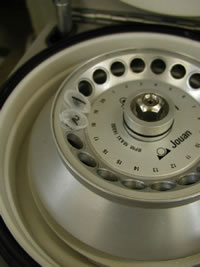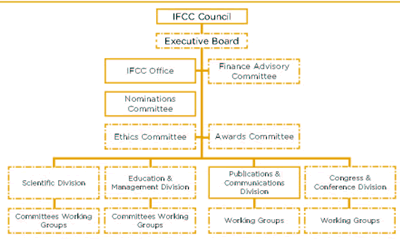|
|
Vol.
25 No. 2
March - April 2003 Clinical
Chemistry & Laboratory Medicine
The
International Federation of Clinical Chemistry and Laboratory
Medicine (IFCC) is an IUPAC Associated Organization, which
has maintained a formal relationship with the IUPAC Chemistry
and Human Health Division for many years. The two organizations
have partnered on a number of projects, including one that
resulted in the IFCC-IUPAC coding system of properties and
units in the clinical laboratory sciences. To present a broader
picture of IFCC activities, CI asked IFCC Secretary
Renze Bais, to review for us the nature and function of this
federation.
by
Renze Bais
The
IFCC’s primary mission is to serve the public interest
in healthcare by providing worldwide leadership in clinical
laboratory science to national professional societies, the
diagnostics industry, governments, and non-governmental organizations.
The Federation was founded on 24 July 1952 and celebrated
its 50th anniversary in 2002 at the XVIII International Congress
of Clinical Chemistry in Kyoto, Japan.
Membership
and Objectives
The
IFCC is a vibrant and highly respected international organization
comprised of 79 Full Member national societies of clinical
chemistry that together represent at least 30 000 clinical
chemists worldwide. In addition, the Federation has 35 Corporate
Members from the diagnostics and related industries that supply
materials and services to laboratory medicine, and 4 Affiliate
Members that are local professional societies with significant
numbers of practicing clinical chemists who do not have access
to the IFCC through a Full Member national society. The Federation
also establishes and maintains contact with individual clinical
chemists in parts of the world where there is no professional
body specifically concerned with clinical chemistry and laboratory
medicine. There are five formally defined aims of the Federation:
- to
promote a vision of clinical chemistry and laboratory medicine
that extends beyond traditional narrow perceptions of the
field
-
to transcend the boundaries of a single nation, a single
corporation, or a geographical, cultural, or linguistic
group of nations, in developing the field of clinical chemistry
and laboratory medicine
-
to provide a forum for standardization, in the broadest
sense, at a high level
-
to disseminate information on "best practices" at various
levels of technology and of economic development
-
to complement and enhance the activities of its members
 IFCC
achieves its aims by publishing information and guidelines
relating to the education of clinical chemists, by defining
principles, and by publishing recommendations for the standardization
of analytical procedures and the interpretation of analytical
results. The Federation enhances communication and personal
professional development by promoting congresses, conferences,
and workshops in clinical chemistry and laboratory medicine,
and by encouraging dialogue with clinicians on matters of
common interest. More detailed information on the aims and
objectives of the Federation, its statutes and rules, and
all other matters, can be found on the IFCC Web site. See
description on page 27. IFCC
achieves its aims by publishing information and guidelines
relating to the education of clinical chemists, by defining
principles, and by publishing recommendations for the standardization
of analytical procedures and the interpretation of analytical
results. The Federation enhances communication and personal
professional development by promoting congresses, conferences,
and workshops in clinical chemistry and laboratory medicine,
and by encouraging dialogue with clinicians on matters of
common interest. More detailed information on the aims and
objectives of the Federation, its statutes and rules, and
all other matters, can be found on the IFCC Web site. See
description on page 27.
Organizational
Structure and Operation
Much
of the IFCC’s business is carried out by divisions and
committees, all of which are accountable (see
diagram) to the Council of the Federation through an Executive
Board. This organizational structure ensures that the IFCC
fully achieves its aims. The Council is the governing body
of the Federation and consists of one representative appointed
by each Full Member, Affiliate Member, and Corporate Member.
Council meets at the triennial International Congress
of Clinical Chemistry, but between Council meetings, the business
of the IFCC is conducted by an Executive Board elected by
Council. Any important matters that arise between Council
meetings are decided by Full Member Representatives who vote
by mail ballot on behalf of their societies. There are currently
four divisions–scientific, education and management,
publications and communications, and congress and conferences–each
of which may have committees and/or working groups undertaking
specific tasks or projects. All National Society Members and
Corporate Members of the Federation may nominate candidates
for the divisions, committees, and working groups, but members
are selected according to merit and expertise, irrespective
of nationality or other affiliation. In addition to the divisions,
an Archives Committee and an Ethics Committee also report
directly to the Executive Board.

(To See Larger Version, Click
Here )
Working
with Other Organizations
Over
the years, the growth of the scientific reputation of the
IFCC, particularly in the areas of standardization and reference
materials, together with recognition of the quality of its
educational endeavors, have led to extensive cooperation with
other international organizations. The earliest such relationship
was with IUPAC, with whom formal reciprocal relations were
maintained at Executive Board and divisional levels until
the year 2000. Throughout most of its history, the IFCC has
also cooperated extensively with the World Health Organization
(WHO) and undertaken projects on its behalf; the WHO, in turn,
has helped the IFCC carry out some of its own projects.
In
addition, the IFCC has actively sought to establish relevant
contacts with international basic and applied science organizations
to reduce duplicative efforts. There have been particularly
productive arrangements with the International Committee for
Standardisation in Haematology (ICSH), the International Society
for Thrombosis and Haemostasis, the International Union of
Biochemistry and Molecular Biology, the International Union
of Immunological Societies, and the World Association of Societies
of Pathology and Laboratory Medicine (WASPaLM). An important
demonstration, for example, of the usefulness of such collaboration
was the 1972 ICSH-IFCC-WASP joint recommendation on nomenclature
in the presentation of results. More recently (1999), the
IFCC and WASPaLM issued a joint statement on "Principles of
Laboratory Accreditation."
The
IFCC maintains relationships with important non-governmental
organizations, including the International Organization for
Standardization, the European Commission-Measurements and
Testing Program, the International Organization for Legal
Metrology, the Council of International Organizations of Medical
Sciences, the International Union of Physiological
Sciences, and the National Committee for Clinical Laboratory
Standards. The IFCC and the European Institute for Reference
Materials and Methods have an important, special relationship
in which they jointly produce reference materials. To all
of these formal contacts can be added the informal, personal
relationships that individual clinical chemists who serve
on IFCC groups have with these and other organizations.
The
IFCC also works with regional organizations, such as the Arab
Federation of Clinical Biochemistry, the Federation of European
Societies of Clinical Chemistry, the Latin-American Confederation
of Clinical Biochemistry, and the Asian-Pacific Federation
of Clinical Biochemistry. The relationship between the IFCC
and these four regional organizations is perhaps best described
as symbiotic, because on the one hand, whilst the IFCC has
assisted and encouraged these organizations in their contributions
to local clinical chemistry, the membership of the IFCC has
been increased through the regional activities. Examples of
what the IFCC has provided the regional groups include the
Visiting Lecturer Program and a Masters Degree course in Clinical
Laboratory Science at the University of La Plata in Argentina.
IFCC’s
Divisions and Committees
The
main working activities of the IFCC are carried out through
its four divisions. The Scientific Division is the largest,
with 6 committees and 14 working groups carrying out specific
projects on its behalf. Much of the work of the Education
Division is also carried out by committees and working groups
(currently eight in all). During the 1990s, in recognition
of the movement from print to electronic media, the IFCC formed
the Communication and Publications Division whose role is
to coordinate communications and publications throughout the
IFCC. This division has been responsible for developing the
IFCC Web site and has recently launched an ebookshop
associated with the site.
Another
type of communication, person-to-person, is the responsibility
of the Congress and Conference Division. Its primary mission
is to oversee the organization of all international congresses
of clinical chemistry and to develop the IFCC General and
Master Discussion Conferences. The division also supports
and provides advice as needed to organizers of regional congresses.
In
addition to the four divisions, there are also two standing
committees reporting directly to the Executive Board. One,
the Ethics Committee, was created in 2000/2001 so that our
profession could respond to ethical issues raised by advances
in genetics and the need for community education.
Corporate
Member Support
For
many years, corporate members have recognized the excellent
achievements of the IFCC by providing financial support for
a number of regular events and awards. The most noteworthy
of these are the Master Conferences sponsored by Roche Diagnostics
and the Beckman-Coulter company and the following five prestigious
awards: the Distinguished Clinical Chemist Award and the Henry
Wishinsky Award for Distinguished International Service, both
sponsored by Bayer; the IFCC Award for Distinguished Contributions
in Education, sponsored by Beckman- Coulter; the IFCC Award
for Significant Contributions in Molecular Diagnostics, sponsored
by Abbott; the IFCC-Roche Award for Significant Advances in
Critical Care Testing; and the IFCC/EDMA Award for Evidence
of Effectiveness of Laboratory Tests. In 2002, our anniversary
year, recipients received their awards during the XVIII International
Congress of Clinical Chemistry in Kyoto, Japan.
Conclusion
During
its first 50 years, the IFCC has made a significant contribution
to improvements in laboratory medicine. However, the organization
is very aware of the challenges this century will hold, especially
in developing countries, and is working closely with many
national and international organizations to continue its role
in improving healthcare throughout the world.
This
summary of the activities of the IFCC has been largely taken
from IFCC Celebrating 50 Years written by John Lines
and Jacques Heeren and published by the IFCC in 2002.
For
further information on IFCC, contact the office at Via Carlo
Farini 81, I-20159 Milano, Italy. Tel: +39 02 6680 9912, Fax:
+39 02 6078 1846, E-mail: [email protected].
Renze Bais <[email protected]>
is IFCC Secretary. He works at Express Laboratory at the Royal
North Shore Hospital in Sydney, Australia.
>
Also in this issue of CI, www.ifcc.org
- presentation by Craig Webster
www.ifcc.org
Page
last modified 14 March 2003.
Copyright © 2002-2003 International Union of Pure and
Applied Chemistry.
Questions regarding the website, please contact [email protected]
|